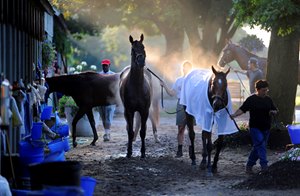State Gaming Commission Addresses Housing and Claiming


The new head of the New York State Gaming Commission promised regulators will soon be acting to improve housing conditions at racetrack backstretches in the state.
Brian O'Dwyer, who was named earlier this year by Gov. Kathy Hochul as board chair of the agency with vast regulatory responsibility over racetracks and other gambling venues, said Aug. 22 at the conclusion of a brief meeting of the board's commissioners that he had taken a recent tour of Belmont Park and Saratoga Race Course with agency executive director Rob Williams to personally view more about the backstretch areas.
O'Dwyer, a longtime lawyer in New York who has heavily practiced in the area of immigration rights and labor relations, said he wanted to learn more about "the concerns I have and continue to have about the housing for the backstretch workers."
Without elaborating, he added, "And we will be addressing those (concerns) in the near future."
O'Dwyer did not say what he saw that specifically raised his concerns. His tour comes after the New York Racing Association has spent millions in recent years on backstretch housing improvements. O'Dwyer said he has embarked on a number of outreach efforts, as well as facility tours, to better learn about the industries he now oversees as chairman of the Gaming Commission.
A New York Racing Association official said the racing corporation has spent $37 million since 2013 to modernize and improve backstretch housing at both Belmont and Saratoga.
"This level of investment is unprecedented in the history of NYRA, and unmatched by any racing organization in the country,'' Patrick McKenna, a NYRA spokesman, said in a statement Monday evening.
"In addition to the construction of new dormitories at Belmont Park, NYRA has completely renovated more than 100 residences at Belmont and Saratoga in recent years. But there is always more work to be done, and NYRA's unwavering commitment to the backstretch community will result in continuous improvements to a broad array of backstretch facilities in the coming years,'' McKenna added.
Earlier in the meeting, O'Dwyer and the commissioners unanimously approved, without discussion, a first step to change the state's Thoroughbred claiming rules to put in writing a "clear process" for resolving objections that can arise following a claim decision, Williams told the board of the proposal that was developed by agency staff.
The plan will now go out in the coming weeks for public comment and be taken up, likely later this year, by the full commission again for final action.
The proposal establishes a one-hour deadline after a race for objections to be raised about a claim; stewards would then hear those objections on the same day and then "promptly" make the call about a horse's ownership. Absent objections after a race, stewards will also have to act within 24 hours of a race if they learn that a claimant was ineligible to participate in a claiming race.
The plan seeks to make the claiming process clearer and faster so that a horse does not end up being trained by a new owner who, weeks or more later, is deemed not to have been eligible to obtain the horse in a claiming race.
The proposal explicitly states that it is the track's racing secretary charged with the responsibility to ensure claimants are eligible to participate in a claiming race.
